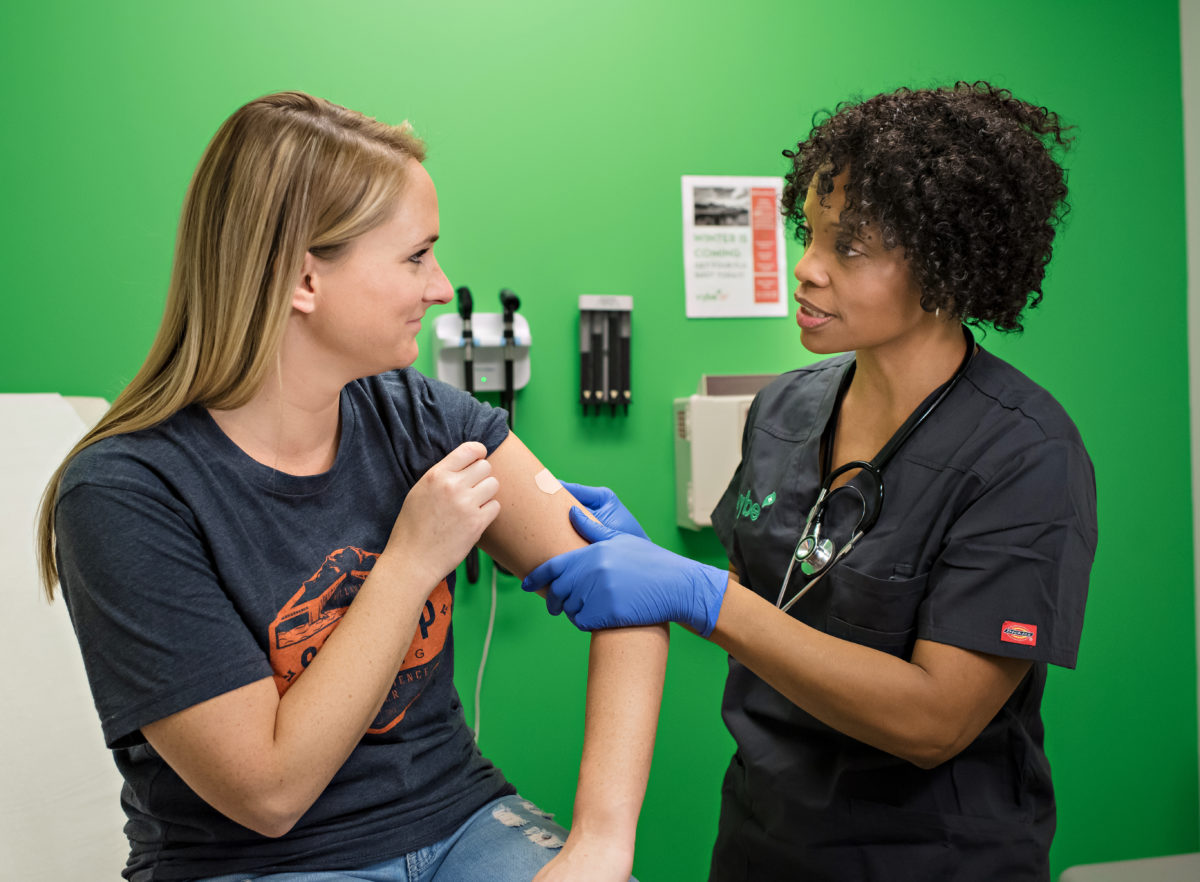
To vaccinate or not to vaccinate? It’s one of the hottest, most-debated topics around — one that’s been argued fervently on both sides by everyday parents and celebrity moms, alike. But research continues to point to the fact that vaccinations are safe and downright essential to well-being.
The World Health Organization (WHO) created World Immunization Week, from April 24 to 30, to “promote the use of vaccines to protect people of all ages against disease.”
According to WHO, immunization is the world’s most successful, cost-effective way to thwart debilitating and easily preventable diseases like measles, mumps, tetanus, and hepatitis B. In fact, WHO projects that 1.5 million deaths could be avoided each year if global immunization coverage improves.
Your local vybe urgent care offers a range of vaccinations, including measles, mumps and rubella (MMR); tetanus, diphtheria and pertussis (Tdap); and meningococcal.
Here, we lay out why those are particularly important and why you should stop into one of our seven locations throughout the Philadelphia region to chat with a physician about which ones are best for you and your family.
This 3-in-one punch protects against a trio of diseases, perhaps most importantly measles, a serious virus that WHO reports killed almost 90,000 people on the planet in 2016 alone. You can catch measles through direct contact and even through the air when infected people cough or sneeze. To properly ensure immunity, the Center for Disease Control recommends two doses of the measles vaccine, which is 97% effective against measles and 88% effective against mumps, another highly contagious virus that could lead to more serious complications if left untreated. Just one dose of MMR is 97% effective against rubella, a mild yet pesky rash that usually lasts around three days.
Tdap is another combination vaccine that protects against three potentially life-threatening diseases: diphtheria, tetanus (lockjaw) and pertussis (whooping cough). WHO projects that 19.5 million children are still at risk of contracting one of these illnesses today, but vaccinations have zonked cases of tetanus and diphtheria by a whopping 99%, and instances of pertussis, once one of the most common childhood diseases worldwide, have been decreased by 80%. The Tdap vaccine is often administered around the age of 11 or 12, but the CDC recommends that “pregnant women should get a dose during every pregnancy, to protect the newborn from pertussis.” Stop into vybe to discuss what treatment is best for you. Tdap is administered at all of our locations.
Cases of hepatitis B in the United States have dropped since 1991, when doctors began recommending routine vaccinations for children. Most recent data show that there were 3,218 cases of acute hepatitis B reported in 2016 in the continental 48 states, compared to 8,036 in 2000. Hepatitis B is a serious liver infection that can be contracted when blood, semen, and other bodily fluids from an infected person enter the body of an unaffected person. Therefore, it’s highly recommended that not only infants be vaccinated, but people who are at risk of coming into contact with bodily fluids, including first responders, healthcare workers, intravenous drug users, and people who are sexually active.
Meningococcal disease, which refers to any illness caused by the meningococcus bacteria, can result in deadly infections of the brain, spinal cord and bloodstream. Teens and young adults are particularly susceptible to the bacteria, which is transferred via respiratory secretions or saliva. Outbreaks are rare in the United States, but the CDC recommends that 11 and 12-year olds should get vaccinated. There are two different types of meningococcal vaccines licensed in the U.S., MenACWY and MenB, which protect against the most common causes of meningococcal disease found in the country. Stop into a vybe urgent care to chat with a doctor about which route is best for you.
You may recognize varicella by its more common name: chicken pox, the itchy disease that puts red bumps all over your body and makes you want to scratch till the cows come home. While chicken pox usually isn’t life-threatening, the CDC recommends two doses of the vaccine for children, teens and adults who haven’t been immunized—mostly as a means of protection for folks who can’t get vaccinated, like pregnant women and those with weakened immune systems. vybe offers a varicella vaccine at most of our locations, so be sure to call ahead to make sure the one nearest you carries it.
Winter in Philadelphia is already tough enough, why make it worse by catching the flu? The CDC says that flu activity is currently elevated nationwide, with between 28.5 million and 32.8 million cases reported between October 1, 2018, and March 16, 2019! The symptoms of flu — muscle aches, runny nose, headaches and fatigue — are enough to lay you out for several days, but sometimes the disease can lead to hospitalization and even death especially in the very young, the elderly and in those with compromised immune systems. As such, the CDC recommends that everyone 6 months or older should get a flu vaccine every year—usually in early to mid-fall before the onset of peak flu season. You can get the flu vaccine at most vybe locations, in a quick, worry-free atmosphere. Also be sure to stop into vybe urgent care if you’re feeling any of the common symptoms. We’ll fix you up and send you on your way before it gets serious.
vybe offers treatment for illness, injury, x-rays, vaccinations and more. We want you to feel better faster. Find your local vybe urgent care and get back to feeling like a healthier you.
